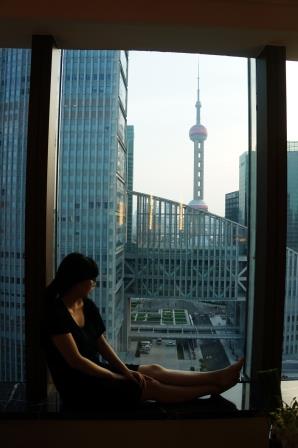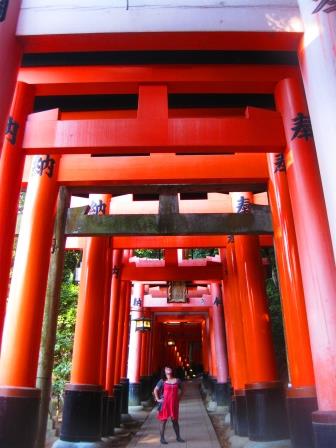From Utah to Japan to China: The Ruby Ronin
 Mary Halloran, from Price, Utah. Lived in Japan for two years and Shanghai, China for three years
Mary Halloran, from Price, Utah. Lived in Japan for two years and Shanghai, China for three years
1. Why did you move abroad?
Moving to Japan was a childhood dream of mine. I grew up watching anime and playing Japanese video games (even self-taught myself Japanese in high school), then gradually fell in love with the culture and history of Japan through my Japanese studies in college. Roaming the neon streets of Tokyo and traversing the alleyways of Kyoto was more than a trip—it was a life goal.
I moved to China afterwards because I studied Mandarin for a short time in University and fell in love with all those whacky tones.
2. How do you make a living?
I was an English instructor with the JET Programme in Japan, and as for Shanghai—well, that’s complicated. With bleak job prospects in the U.S., I bought a one-way ticket to Shanghai on a wing and a prayer, hoping to find work there and a company willing to sponsor for my visa.
Two weeks later, I somehow found a full time job as a Japanese business analyst at a consulting agency. Now I work in translation, interpreting and travel.
3. How often do you communicate with home and how?
Skype was my lifeline. I lived in the boondocks of Japan, so communicating with home was one of the highlights of my week. I tried to call home at least once a week, but when I moved to Shanghai work and social life got in the way and Skype calls were a bi-weekly occurrence.
Nowadays with Wechat, Whatsapp and Viber it’s easy to text people from around the world! Technology makes things so easy!
4. What's your favorite thing about being an expat in Shanghai?
My favorite thing about being an expat in Shanghai is the dynamic atmosphere of the city. China’s economy is on a roll right now (albeit slowing a bit right now), and you can feel the buzz of all that growth and opportunity in the air. Chinese citizens from other provinces as well as foreigners from Europe, Southeast Asia, North America and more are flooding the streets of Shanghai looking for opportunity, dreams, and a slice of that exciting Shanghai life. The vibe is infectious. There are so many people to meet (both local and from abroad) and it’s a great place to make connections and lifelong friends.
It’s a city that is an international hub, yet still retains its core traditions as a Chinese landmark.
5.What’s the worst thing about being an expat in Shanghai?
The worst thing about being an expat in Shanghai is the toll it takes on your health. The air quality in Shanghai grows worse by the year, and it’s not uncommon to have days where the pollution reaches epic proportions—to the point where you need a mask to walk outside. Food is also not regulated to the same standard as a developed country, so rotten (and fake!) meat are sold in the masses, used cooking oil is bottled and resold and many foods in restaurants are not prepared with proper sanitation. If you live in China, be prepared to experience at least one brutal round of food poisoning.
6. What do you miss most?
Craft beer (tsingdao or nothing here), affordable cheese (a tiny little block in the foreign supermarket is twice as much as home!), and good quality healthcare (Chinese hospitals are cheap—but let’s just say, you get what you pay for).
7. What did you do to meet people and integrate in your new home?
I met a lot of friends through my new job, but I also tried to attend meetups and go to special events held in the city. Smartshanghai.com lists the latest happenings in Shanghai. The great thing about Shanghai is—there’s an event going on for everything. Shanghai is one of the easiest places to meet both expats and locals.
8. What custom/ habits do you find most strange about your adopted culture?
I was first alarmed by how religiously Chinese people drink hot water (it’s served at restaurants and almost every meal)!
Also, I assumed that all Chinese people speak fluent Mandarin—but I was very wrong. Many locals in Shanghai can speak Mandarin, but prefer to speak in their native dialect Shanghai-hua.
And not just Shanghainese, but other provinces (mostly in the south) speak in a dialect that is COMPLETELY different from Mandarin. So even if you can speak Mandarin, you may not be able to communicate with the locals!
9. What is a myth about your adopted country?
I write about this in my 10 misconceptions Americans have about China post, but I think it’s the concept of communism and human rights. Many Americans imagine 1984 when I bring up China—they think all phones are wiretapped and every word you say about the government will land you in jail. However, you’re free to speak to your friends about the government, just don’t start an online group or movement and you should be fine. While Chinese rights have a long way to go, you won’t be thrown in jail for disagreeing with the prime minister’s policies during a coffee chat with friends.
10. Is the cost of living higher or lower than the last country you lived in and how has that made a difference in your life?
I like to say that Shanghai is a New York lifestyle for half the price. Shanghai has all of the action, excitement and diversity that big cities like San Francisco and New York have, but without the 3000 dollar closet apartment. A cheap flat in Shanghai can range from 500-1000 USD/month, and that’s for the center of the city. Shanghai also has dirt cheap public transportation (50 cents to ride the metro), so there’s no need for a car. Shanghai is a great place to be young, enjoy the big city, and not break the bank.
11. What advice would you give other expats?
If you’re going to Shanghai to look for work, do some research first. It’s getting harder and harder for foreigners to secure work visas and the Chinese government is really cracking down on this. In order to apply for a visa you’ll need to prove to the government that you can do what Chinese people can’t. Shanghai jobs also don’t tend to pay as highly as those in your home country, so if you’re looking for work in China set up a solid plan before dropping everything and moving to China.
12. When and why did you start your blog? 
I started my blog first as a sort of diary for my life in Shanghai, but later I expanded it more into a specialty blog about China, Japan and now traveling. I hope that people can read my blog as an entertainment and to get tips for life as an expat, as well as for traveling to different destinations in the U.S., Asia and more.
Mary's blog, The Ruby Ronin

To find out more about living in China, refer to our
To be considered for an interview (as well as other articles), add your blog to BlogExpat!
Part of the EasyExpat.com adventure since 2008. Drink, Travel, Write